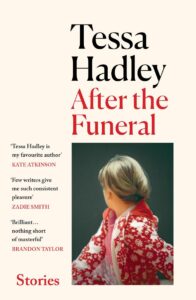September 3, 2024
AFTER THE FUNERAL, by Tessa Hadley
I’ve never read a Tessa Hadley short story before, just her novels (most recently, Modern Love, and mercifully I still have most of her backlist before me [though they’re not easy to come by—perhaps some of them were never published in Canada?], so I was excited about her new release After the Funeral because it was a Tessa Hadley book at all, and not necessarily because it was a story collection. And then I started reading it and then spent two days walking around exclaiming, “OMG THIS BOOK THIS BOOK THIS BOOK!” because this Tessa Hadley story collection is basically 12 Tessa Hadley novels in one, each story with a ballast that is decades of history and so much perfect detail, and possibly the mind was not meant to handle so much literary goodness in a single sitting or two, because it was seriously overwhelming (and possibly I’m hormonal), but also seriously wonderful, these stories so rich and satisfying, where so much happens, where so much and said and goes unsaid.
These are stories about departures and arrivals, and also odd little intersections that occur somewhere between the two. In a recent New York Times Review of another book, Dwight Garner cited a quotation by John Edgar Wideman, who’d written, “You don’t have to be very smart to write a review of a book of short stories… All you need to say is that some stories in the book are better than others,” but I can’t even say that about this book, because they’re all wonderful. The title story is about what happens to a family after the death of a father, about how long “after the funeral” really can be. In “Dido’s Lament,” Lynette encounters her ex-husband, and reads everything all wrong. “The Bunty Club” is about three sisters, now adult, coming together upon the imminent death of their mother. “My Mother’s Wedding” features the first of a few children in this collection raised by less-than-benign neglect, and the second appears in “Funny Little Snake,” in which a woman encounters her not-so-lovable stepdaughter for the first time and then her even less charming mother. Two adult sisters meet after years of estrangement and pretend not to know each other in “Men.” “Cecelia Awakened” is about a teenage girl on holiday with her parents who finally discerns her separateness from her family, and her family’s separateness from everything else, with gut-punchingly relatable lines like, “Those girls at the next table were silly, but they were worldly, she thought, trying out that world. They were in the world and she and her parents were somehow shut out of it.” In “Old Friends,” a tragedy could possible bring together a couple together, but it turns out the absence of the third in their triangle over pulls them apart. A dream of childhood is still as vivid to a grown man as the present moment in “Children at Chess.” “The Other One” is an epic in under 30 pages, the story of a woman who encounters a figure from her father’s past in an entirely different context. “Mia” is a portrayal of glamour from a teenager’s point of view and finally “Coda,” a lockdown story of loneliness, loss and longing for connection.
Singular, vivid and compelling, every last one of them. This book came out ages ago in the US and UK and I’m glad to finally get a chance to read it. It’s one of my favourite books of the year.






